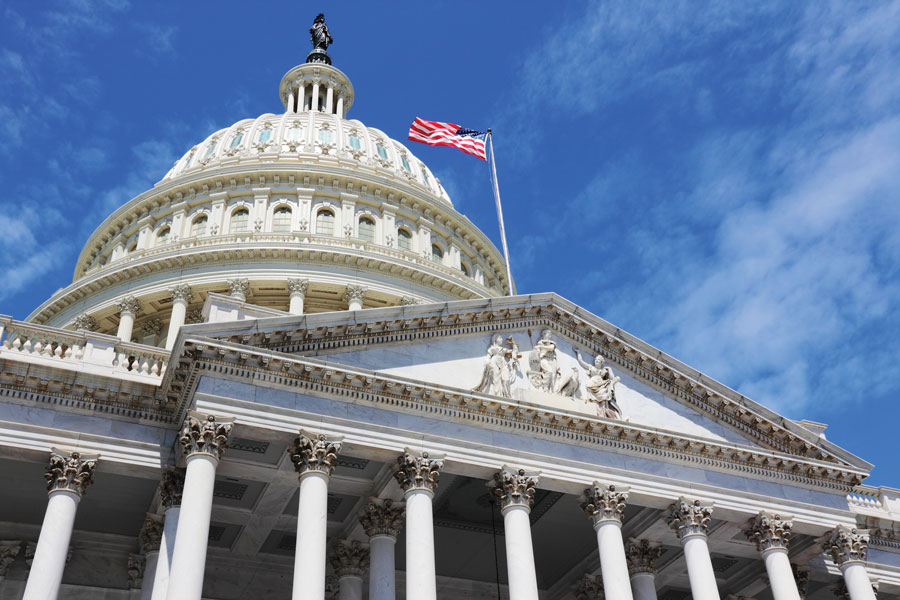

If a sweeping social, climate spending and tax bill stalled in the Senate is revived, it could raise the possibility of retroactive tax changes that tend to pose challenges for financial advisers.
In December, the $1.75 trillion Build Back Better Act hit a wall in the Senate when Sen. Joe Manchin, D-W.Va., voiced opposition to the measure, which had been approved in November by the House. Under parliamentary rules that avoid a Republican filibuster, all 50 Senate Democrats must support the legislation to pass it.
Negotiations between President Joe Biden and Manchin remain stalled, according to Politico, a Washington publication specializing in politics and policy. But there's still hope among Democrats that the measure can get back on track.
If the legislation begins to move but takes several more weeks to be approved, the question will be when tax policies contained in the bill — including raising the cap on the state and local tax deduction — will become effective.
There’s a chance that provision and others will reach back to the beginning of this year or into 2021. A summary of the House bill said the SALT deduction would be effective for tax years beginning after 2020.
That could be a headache for the Internal Revenue Service, which would have to adjustment its systems, and for advisers, who might have to revisit clients’ completed tax planning.
“I hope they won’t make decisions in March that affect 2021 [taxes],” said Joanne Burke, owner of Birch Street Financial Advisors.
The uncertainty around tax policy is continuing into the New Year after flummoxing advisers throughout 2021. It’s still unclear whether the measure lifting the SALT cap will survive and, if so, when exactly it’s designated to have been born.
“It could be retroactive, but it gets harder to do as time goes along,” said Richard Pon, a San Francisco financial adviser and accountant.
Lawmakers are leery of making too much new tax policy backward-looking, said Jorge Castro, a member at the law firm Miller & Chevalier.
“The longer Build Back Better lingers, the harder it becomes for Democrats to pass something retroactively,” said Castro, a former Democratic counsel for congressional tax committees and a former IRS official.
Advisers were working with clients right up to the end of the year on decisions about making property tax payments based on whether Build Back Better would be approved by Congress. For those who went ahead, retroactivity could be boon.
“If they do make it retroactive to 2021, it’s a really big surprise,” Burke said. “It’s a belated holiday gift.”
If the White House and Manchin can come to an agreement, Castro expects the higher SALT deduction cap to remain in the bill because it’s important to so many Democratic lawmakers. But if the legislation continues to shrink in size — say to $1 trillion — the SALT provision could also be resized.
“It’s in the cards that it could be scaled back,” Castro said.
Jonathan Duggan, an adviser at Hemington Wealth Management, supports raising the SALT cap because shielding more income from taxation allows more creative planning. But he wishes its fate could have been decided earlier.
“It gives us more running room for Roth conversions, capital gains harvesting and retirement account distributions,” Duggan said. “If we would have known about it in advance, then we could have been more strategic in how we recognized income in 2021.”
For now, advisers are in their familiar wait-and-see mode.
Congressional negotiations “could very well go into February,” Castro said.

Elsewhere in Utah, Raymond James also welcomed another experienced advisor from D.A. Davidson.

A federal appeals court says UBS can’t force arbitration in a trustee lawsuit over alleged fiduciary breaches involving millions in charitable assets.

NorthRock Partners' second deal of 2025 expands its Bay Area presence with a planning practice for tech professionals, entrepreneurs, and business owners.

Rather than big projects and ambitious revamps, a few small but consequential tweaks could make all the difference while still leaving time for well-deserved days off.

Hadley, whose time at Goldman included working with newly appointed CEO Larry Restieri, will lead the firm's efforts at advisor engagement, growth initiatives, and practice management support.
Orion's Tom Wilson on delivering coordinated, high-touch service in a world where returns alone no longer set you apart.
Barely a decade old, registered index-linked annuities have quickly surged in popularity, thanks to their unique blend of protection and growth potential—an appealing option for investors looking to chart a steadier course through today's choppy market waters, says Myles Lambert, Brighthouse Financial.
